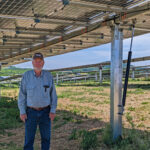SOLAR ENERGY
Our Commitment
Investing in distributed solar energy projects to prioritize reliable, on-site renewable energy as Virginia transitions to a carbon-free electric grid.
THE ISSUE
Distributed solar energy is a key component in reaching Virginia’s 100% zero-carbon-emissions standard laid out in Virginia’s Clean Economy Act (VCEA). Distributed solar energy decreases land distrubance because projects are built on a pre-existing infrastructure. It also decentralizes energy which creates a more resilient electricitygrid. With the right policy in place, solar energy will reduce rising peak demand, decrease carbon-emitting sources on the grid, and increase ratepayer savings. Getting more solar on homes, businesses, and schools can reduce costs, enhance public health, and combat climate change.
Clean Energy & Climate Recap: 2025 Bill Outcomes
Virginia Conservation Network advocated for 65 bills this General Assembly session that support the Virginia Clean Economy Act, enables more local solar energy, regulates the data center industry's energy demand, and more.
Bill of the Day: Community Access to Renewable Energy (CARE) Act
VCN is supporting efforts to increase access to local, community energy across the Commonwealth through the CARE Act.
New Laws: SAVE Act Saving Energy and Money
The SAVE Act, which went into effect on July 1st, will strengthen energy efficiency savings targets that utilities are required to meet under the Virginia Clean Economy Act. These utility accountability measures will save Virginia residents money and power while working towards the state’s climate goals.
New Laws: Making Shared Solar More Equitable
On July 1st, two new laws will go into effect that expand shared solar programs in Virginia. These laws will increase access to Virginians to participate in the clean energy transition.
Solar For All, and $156M for Virginia
Virginia received $156,120,000 through Solar For All. One hundred percent of the funding awarded today is dedicated toward distributed solar investments to benefit low-income and disadvantaged communities.
Bill of the Day: Prioritizing Distributed Solar Energy
VCN is supporting the prioritization of affordable, on-site solar energy to ensure affordable solar for all Virginians.
RESOURCES
Report: Assessing Benefits of Distributed Solar in Virginia
VCU's Institute for Sustainable Energy and Environment (ISEE) and Wilder School Center for Public Policy released a report updating a 2020 study on the economic benefits of installing 2,500 MW of distributed solar capacity in Virginia, and whether the state is on track to meet this goal.
Report: Empowering Tomorrow
Clean Energy States Alliance recently released a report outlining how Solar for All state programs, funded by the Inflation Reduction Act, will benefit low-income and disadvantaged communities.
US Solar Development Agreement: Integrating Climate, Conservation, & Community
Large solar developers, leading land conservation and environmental organizations, tribal nation representatives, agricultural interests, community groups, and investors have aligned in a collaboration agreement, emphasizing solar development strategies that prioritize climate, conservation, and community.
Webinar Series: Clean Energy Funding for Rural Virginia
The Virginia Solar Initiative and the Virginia Department of Energy hosted a two-part webinar series informing Virginia's rural communities of federal clean energy funding opportunities.
Implementation Framework for the Greenhouse Gas Reduction Fund
The Environmental Protection Agency released a framework to implement the Greenhouse Gas Reduction Fund, aimed at financing projects nationwide to reduce greenhouse gas emissions and air pollution through the Inflation Reduction Act.
User Guide to the Inflation Reduction Act
BlueGreen Alliance released a user guide to help understand the structure of the Inflation Reduction Act, including its funding, mechanisms, and labor, equity, and justice provisions.









